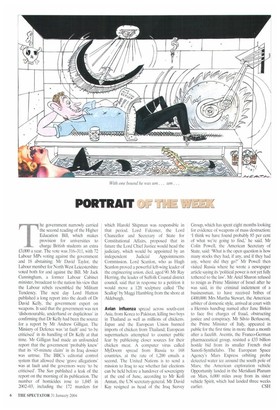T he government narrowly carried the second reading of the Higher
Education Bill, which makes provision for universities to charge British students an extra £3,000 a year. The vote was 316-311, with 72 Labour MPs voting against the government and 18 abstaining; Mr David Taylor, the Labour member for North West Leicestershire voted both for and against the Bill. Mr Jack Cunningham, a former Labour Cabinet minister, broadcast to the nation his view that the Labour rebels resembled the Militant Tendency. The next day Lord Hutton published a long report into the death of Dr David Kelly, the government expert on weapons. It said that the government was not 'dishonourable, underhand or duplicitous' in confirming that Dr Kelly had been the source for a report by Mr Andrew Gilligan. The Ministry of Defence was 'at fault' and 'to be criticised' in its handling of Dr Kelly at that time. Mr Gilligan had made an unfounded report that the government 'probably knew' that its 45-minute claim' in its Iraq dossier was untrue. The BBC's editorial control system that allowed these 'grave allegations' was at fault and the governors were 'to be criticised'. The Sun published a leak of the report on the morning of its publication. The number of homicides rose to 1,045 in 2002-03, including the 172 murders for
which Harold Shipman was responsible in that period. Lord Falconer, the Lord Chancellor and Secretary of State for Constitutional Affairs, proposed that in future the Lord Chief Justice would head the judiciary, which would be appointed by an independent Judicial Appointments Commission. Lord Scanlon, who as Hugh Scanlon proved a powerful left-wing leader of the engineering union, died, aged 90. Mr Ray Herring, the leader of Suffolk Coastal district council, said that in response to a petition it would move a 12ft sculpture called The Scallop' by Maggi Hambling from the shore at Aldeburgh.
Avian influenza spread across south-east Asia, from Korea to Pakistan, killing two boys in Thailand as well as millions of chickens. Japan and the European Union banned imports of chicken from Thailand; European supermarkets attempted to counter public fear by publicising closer sources for their chicken meat. A computer virus called MyDoom spread from Russia to 168 countries, at the rate of 1,200 emails a second. The United Nations is to send a mission to Iraq to see whether fair elections can be held before a handover of sovereignty at the end of June, according to Mr Kofi Annan, the UN secretary-general. Mr David Kay resigned as head of the Iraq Survey
Group, which has spent eight months looking for evidence of weapons of mass destruction: 'I think we have found probably 85 per cent of what we're going to find,' he said. Mr Colin Powell, the American Secretary of State, said: 'What is the open question is how many stocks they had, if any, and if they had any, where did they go?' Mr Powell then visited Russia where he wrote a newspaper article saying its 'political power is not yet fully tethered to the law'. Mr Ariel Sharon refused to resign as Prime Minister of Israel after he was said, in the criminal indictment of a businessman, to have received bribes of £400,000. Mrs Martha Stewart, the American arbiter of domestic style, arrived at court with a Hermes handbag named after Jane Birkin to face five charges of fraud, obstructing justice and conspiracy. Mr Silvio Berlusconi, the Prime Minister of Italy, appeared in public for the first time in more than a month after a facelift. Aventis, the Franco-German pharmaceutical group, resisted a £33 billion hostile bid from its smaller French rival Sanofi-Synthelabo. The European Space Agency's Mars Express orbiting probe detected water ice around the south pole of Mars; the American exploration vehicle Opportunity landed in the Meridiani Planum on Mars, 6,000 miles away from its sister vehicle Spirit, which had landed three weeks earlier. CSH




























































































 Previous page
Previous page